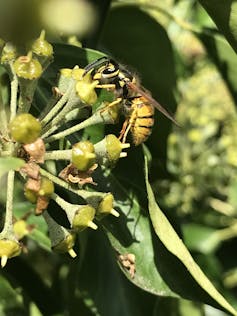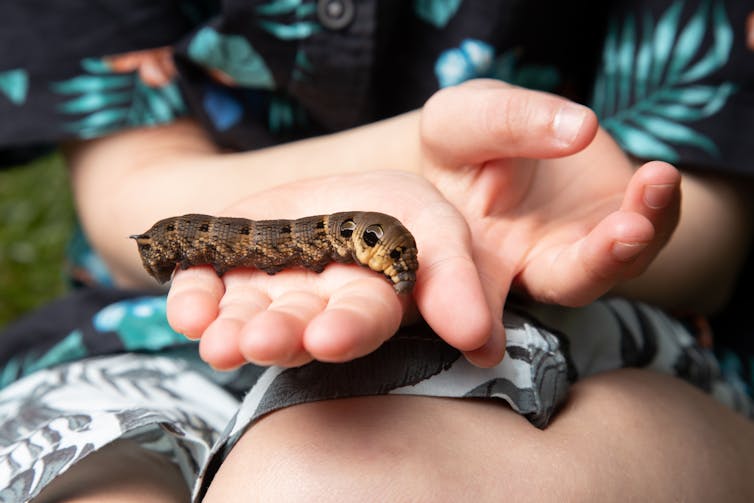
[ad_1]
Spring is the time of the year in which my friends remember a strange function I have, because the frightening insect has just appeared in their kitchen and feel panic. “It’s huge!” One ray. “Help! What do I do? I swear to be the killing that I saw on social media.”
Explain to my friend that this is a popular wasp queen, who recently appeared from the hibernation. She lost 40 % of her body weight and needs sugar. You will soon build a nest – using wood from my friend’s garden fence – laying eggs and raising them to adulthood by feeding them Larvae, flies, aphids and spiders. If you survive, you may put 10,000 eggs during the summer, as 10,000 workers are produced that hunted more of these alleged lesions and pollinating plants in my friend’s garden.
Now, my friend of the tanner offers some honey. While watching her feeding and flying away, he thinks about the benefits that this one insect will bring to his garden this summer.

Sirian Somner
My friend is not unusual: Like many people, he lacks words to describe nature and knowledge to name it. Without this Literacy of natureIs it wonder that many people do not know how to care about the natural world, or why should we bothered us?
Humans are more Separate Ever, partly because technology means that we have less reasons to spend time in nature – and this is what environmental scientists call “the extinction of experience”. Less than half of adults in the UK feel Windly linked to nature; Most children cannot recognize harsh morals, bumblebees or Robins. People do not understand what the term Natural history means Or why it matters.
I recently seen this during the lecture. In a study poll, students of biological sciences summarized natural history as: “The Old Victorian Gentlemen”, “Museums”, “Dinosaurs” and “The Old Model”. They also classified the natural history as unrelated or not related to their certificates programs, as a few people classify it as very important or very important.
We were not always like this. Natural history is the study of natureIt is the oldest knowledge. Natural selection is that the first human beings were The brilliant natural scholarsIn order to find food and not to become food. Nature inspired some of the most influential scholars, from Aristotle to Charles Darwin.
Biologists were also influenced by nature. In words Physicist Albert Einstein: “See deeply in nature, and then you will better understand everything.” English mathematician Isaac Newton considered himself “Natural Philosopher” Just a stressful nature would be interested in watching the fall of an apple.
The existence of the language to naming nature and its description is a gateway to innovation, creativity and discovery that curiosity moves. This is important because our food, Health and luxuryInnovations and creativity depend on Note, curious and understanding From the natural world. From termites inspired Air air conditioning technology to BurryMicing VelcroAnd The layout of the city -led city.
Without noticing how nature has solved problems and without the ability to name the source and participate with others in order to repeat notes, none of these breakthroughs will happen. Where will our next innovations come from, if we lose the tendency and the ability to note nature, its name and knowledge?
Knowledge about nature also makes us More environmentally supportive It is more likely to make the planet’s friendly decisions. This is very important with our continuation It exceeds the limits of the planetsDriving climate change and loss of nature. As things continue, our continuous divorce from nature means that the next generation is not equipped for the future. Nature literacy helps us to re -communicate and make the right decisions.
Increased nature literacy
To become a concrete society that begins with three main steps.
1. Notice. Learn how to distort her attention through nature, curious about the usual, and redefine a feeling of dread and wonder that inspired science, innovation and art for several centuries.
2. Name. Embrace the joys of learning to naming nature. Can you tell an oak beech tree? Bees from bees from bees? By the ability to name something, we develop a connection with it and desire to know it – whether it is for graphics or weeds.
3. Care. With names and knowledge, care, responsibility and design come to take action to protect nature, so that future generations have the biological diversity needed for learning and inspiration in the future.

Simon Ti/Shockstock
Nature’s observation means that we are more likely to be careful. Participation of our natural knowledge with others helps to push the erasure agenda of nature from the bottom of the old Victorian shoes to the twenty -first century. Even when this type of nature involves Wonderful wasps.
Baca Juga: History History GCSE welcome – but climate change should be part of the entire curriculum
After 11 years of campaigns in campaigns, Mary Collele prompted Mary Mary Colloyel the erasure of nature to the agenda of the UK government with the approval of a qualification at the exam level for secondary school children- Natural History GCSE. This is an important first step forward in converting the baseline for nature literacy between the next generation in the United Kingdom.
But the knowledge of reading and writing in nature needs to become more integrated into society. Nature -based jobs are the future. In industry and academic circles, startups and technology, front -line roles are now focused on “green” or “based” natural functions to provide exactly based solutions for a sustainable future. The demands of these jobs flourish, however The lack of skills in the necessary nature of the Mustaha It is well recognized. Modern report It identified the knowledge of biological diversity as the most important technical skill identified by the nature -based employers worldwide.
We need to change cultural standards and societal expectations so that nature literacy is taught and valued by everyone – not only environmental scientists. The government and teachers condemn the future of our planet.

You don’t have time to read about climate change as much as you want?
Get a weekly tour of your inbox instead. Every Wednesday, the environment editor writes in the conversation, imagine, a short email message that is slightly deeper in only one climate case. Join more than 40,000 readers who have subscribed so far.
